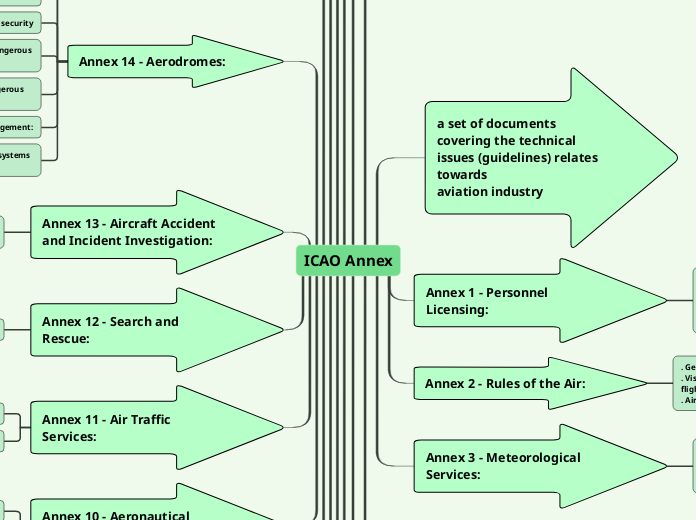ICAO Annex
Type in the name of the book you have read.
Annex 6 - Operation of Aircraft:
Licensing of operators
Aircraft airworthiness
Standards for the operation of aircraft
Annex 7 - Aircraft Nationality and Registration Marks:
Requirements for aircraft nationality and registration marks
Annex 8 - Airworthiness of Aircraft:
Standards for airworthiness
Aircraft certification
Standards for airworthiness
Annex 9 - Facilitation:
Standards for facilitation of international air transport
Annex 10 - Aeronautical Telecommunications:
Navigation systems
Communication procedures
Annex 11 - Air Traffic Services:
Separation and control of air traffic
ATS provision
Annex 12 - Search and Rescue:
Standards for search and rescue services
Annex 13 - Aircraft Accident and Incident Investigation:
Standards for aircraft accident and incident investigation
Annex 14 - Aerodromes:
Annex 18 - The Safe Transport of Dangerous Goods by Air:
Annex 17 - Security:
Standards for aerodrome design and operations
Annex 15 - Aeronautical Information Services:
Standards for aeronautical information services
Annex 16 - Environmental Protection:
Type the main events of the book, classifying them in: events from the beginning, events from the middle, and events from the end of the book.
Describe the story visually. Add a representative picture for each of them.
Noise abatement measures
Standards for aircraft engine emissions
Annex 17 - Security:
Standards for aviation security
Take notes while you read the book. Write here your favorite quotes from the book.
Annex 19 - Safety Management:
Standards for safety management systems in aviation
Annex 19 - Safety Management:
Annex 5 - Units of Measurement to be Used in Air and Ground Operations:
. Standard units of measurement in aviation
Annex 4 - Aeronautical Charts:
. Standards for aeronautical charts
. Aeronautical charting services
Annex 3 - Meteorological Services:
. Standards for meteorological services
. Meteorological watch offices
. Meteorological information for air navigation
Annex 2 - Rules of the Air:
. General rules for the operation of aircraft
. Visual flight rules (VFR) and instrument flight rules (IFR)
. Air traffic services
The main idea is what the book is mostly about.
Some tips to find out the main idea of a book easier:
- Read the title.
- Look for the text features.
- Figure out if you are reading a fiction or a non fiction book.
- Think about some examples that support this idea.
Annex 1 - Personnel Licensing:
Type the names of the book characters. Start with the main character.
Draw arrows to represent the relationship between them and if it is possible write on them what they represent for each other (if they are relatives, friends, lovers, enemies etc.)
. Types of licenses (Pilot, Flight Engineer, . Navigator, etc.)
. Requirements for issuance
. Qualifications and training standards
. Medical fitness standards
Additional info
Medical fitness standards
Qualifications and training standards
Requirements for issuance
Types of licenses (Pilot, Flight Engineer, Navigator, etc.)
What are the characteristics that best describe the character? Type them here.
a set of documents
covering the technical issues (guidelines) relates towards
aviation industry
What is the reason why the author wrote the book?
Chicago
Convention 1944
Who is the author of the book? Type in his/her name.
Article 37: International
Standards and Recommended Practices (SARPs).
Annex 18 - The Safe Transport of Dangerous Goods by Air:
Take notes while you read the book. Type here the resources, books, or websites that the author mentioned and you want to check out later.
Standards for the transport of dangerous goods by air

